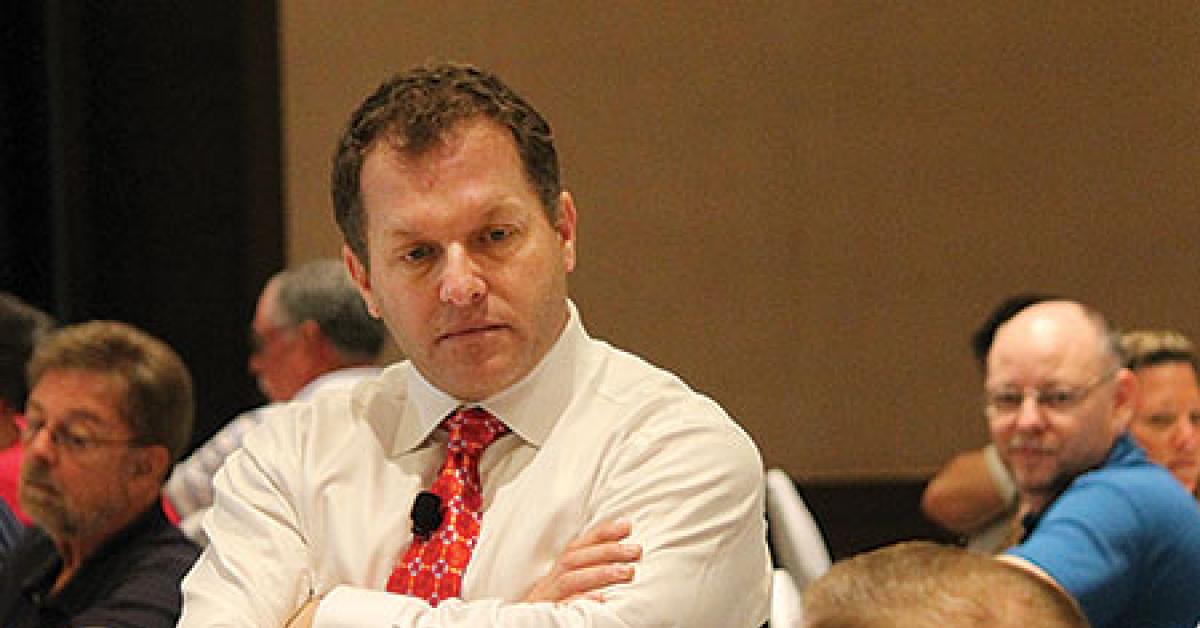CANCUN, Mexico — As if Mexico’s sun, sand and surf in January weren’t enough, a highlight of the Five Star & Brainstorming Conference here was John R. DiJulius III’s presentation, How to Make Your Customer Experience World Class.
DiJulius, author of The Customer Service Revolution, offered special insights into a customer’s life and how dry cleaners can translate that into a superb experience.
“How can we be the brand that our customers literally can’t live without?” he asked the audience attending the joint National Cleaners Association/Drycleaning & Laundry Institute event, pacing around and among the scattered round tables where attendees sat.
It starts with service aptitude, which DiJulius defined as a person’s ability to recognize opportunities to exceed customers’ expectations, regardless of the circumstances. And where does this come from? It comes from previous life experiences, previous work experiences and current work experience.
Often, it is the most recently hired, least trained, lowest paid employees who deal with customers the most, he says. Do you think that’s an ideal situation?
“Unless you’re hiring directly from the Ritz-Carlton, the Four Seasons Hotel, Nordstrom’s, they worked for someone who wasn’t world class,” he says. “They worked for a leader who wasn’t world class, and they’re ‘brainwashed’ in a different way than you want them to be.”
Thus, it is not your employee’s responsibility to have high service aptitude, it is the company’s responsibility to “give it to them.”
“Just as you would never allow someone to handle someone’s clothing without the proper training, you can’t let them interact (with customers) without the proper hospitality training,” he says.
The concept of “world class” starts at the top, with “executive sponsorship.”
“You don’t [just] have annual customer service training once a year with your staff,” DiJulius says. “That’s like deodorant: with time, it wears off and the odor comes back. It’s every time you speak—about anything. Sales, marketing, promotions, new point of sale, new equipment. You bring in how that affects the customer experience.”
He played video clips of iconic CEOs—Walt Disney, Amazon’s Jeff Bezos, Starbucks’ Howard Schultz, Apple’s Steve Jobs, Virgin’s Richard Branson—that illustrated how each routinely framed their comments with the customer in mind.
A BETTER UNDERSTANDING
During a recent survey of 300 company CEOs from various industries, 80% of them said they believe they deliver world-class service, DiJulius says. What they didn’t know is that 3,000 of their customers were being surveyed at the same time. And what did they say? Just 8% of customers believe they received world-class service from these same companies.
“You’re in the customer perception business,” DiJulius says. “You can tell me how great you are, but your average ticket, your repeat customers, whatever your key metric is doesn’t lie.”
Employee apathy creates customer apathy, and customer apathy is the enemy of a successful business, he says.
The best way to improve a customer’s perception of your service is to put yourself in their shoes. By better understanding the demands on their time, the pressures they’re under, the personal issues they may have, their likes and dislikes, etc., you improve your chances of fulfilling their needs and pleasing them while you’re doing so.
DiJulius calls Chick-fil-A the “Ritz-Carlton of fast food,” because its service vision is to make every guest feel cared for unlike anywhere else. “This is yours,” he says, pointing to the audience. “This relates to you.”
The restaurant chain trains its employees to learn to see the world through their customers’ eyes. One tool it uses is an emotionally charged training video that pictures a variety of customers and their untold stories. There’s the father who just lost his job and doesn’t know how he’ll provide for his family. And the young immigrant who just received U.S. citizenship. Over there sits the widow whose husband died recently; today would’ve been their 50th anniversary. And there are more. The video is available HERE.
World-class service organizations do two things better than everyone else: they dictate the best service aptitude, and they consistently put their employees in the shoes of the customers, DiJulius says.
“Every moment is an interaction to tell me whether this is going to be a positive or negative experience.”
Now, every business has “policies” that it stands by, but DiJulius—owner of a chain of upscale spas in the Cleveland area—prefers to use “guidelines” that permit his employees to act in the best interests of the customer while retaining their business.
He shared a story about Spirit Airlines, which infamously refused to refund a terminal cancer patient’s $197 ticket when doctors would no longer allow him to fly. The incident gained worldwide media coverage, “grounding” the brand’s reputation.
“Build your company’s customer service experience as if no customer had bad intentions,” he says. “Everyone builds it the opposite way, to catch that 2%, then you punish the other 98%.”
DiJulius is a believer than if the service is good enough, a customer truly won’t care if they’re paying more here than they would across town. He favors competing in “experience wars” instead of “price wars,” because “the problem with discounting is there is always someone more willing to give it away than you.”
There has to be a paradigm shift: from a commodity a customer can get anywhere to an experience he/she can only enjoy with you.
Have a question or comment? E-mail our editor Dave Davis at [email protected].


